The mother of all books
 August 6th, 2006 by jules
August 6th, 2006 by jules
Motherhood is a lot of things. It’s joyful, demanding, weighty, sometimes monotonous. One moment you’re lovesick; the next, perplexed and jaded — often, you’re all of these things at once. And, as a good friend of mine likes to say, early motherhood, in particular, is a lot like boot camp.
One thing motherhood isn’t is talked about — not in a forthcoming and truly honest way in this country. I spent much of the first year of my oldest daughter’s life in shock (it didn’t help that she was near-colicky, but I digress). Folks told me repeatedly — while I was pregnant — that my life would change. It doesn’t change when you have a baby; it explodes, and the pieces fall and put themselves back together in an all new and entirely different way. Though having children is undeniably wondrous and profound, this rupture of all-you-knew-before takes getting used to. Perhaps no one could have adequately prepared me for it; besides, I wouldn’t have believed them. And who wants to be Debbie Downer about the very sacred notion of motherhood? And the decision as to whether stay at home or return to work after having children is filled with much hesitancy and confusion for many mothers, too. Can I be a feminist and not be what our society calls a working mother? I wondered. Hmmmm, motherhood isn’t as breezy as most mothers will tell you it is.
After my second daughter was born, another mother I had met recommended a few books on motherhood — non-fiction titles that were sociological stances on motherhood today, if you will. And boy howdy did they open up my world. They also helped eradicate my feelings of isolation, my fears that I was the only mother whose daily life with my children didn’t look like a Pampers ad. And, best of all, they were really thought-provoking, too. Here is a round-up of the ones I’ve read since the day that a few were recommended to me — very engaging non-fiction reads for both mamas and papas and anyone else interested in what it means to live as a mother in America today.
Oh, and I feel like I should apologize in advance for the length of this post, but I figure you won’t be reading it anyway if you aren’t interested in this topic. I took a little bit of wisdom from each book, and some I loved more than others. But isn’t that the best way to read on a topic? We mamas don’t need to be labelled, thanks very much, and even if I felt an author or co-authors of a book (ahem) were unfairly stereotyping a mama based on something she does or doesn’t do, I still took it with a grain of salt and garnered whatever wisdom I could from them when they weren’t annoying me. And if you are interested in this topic but don’t make it to the end of this list, let me add that the two best things for me that came out of all this reading are the following Web sites (just FYI for any mamas — or papas, for that matter — who are interested in working towards change): MOTHERS (Mothers Ought To Have Equal Rights) at mothersoughttohaveequalrights.org and Moms Rising at momsrising.org.
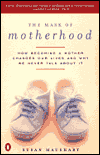 The Mask of Motherhood: How Becoming a Mother Changes Our Lives and Why We Never Talk About It by Susan Maushart (1999) — Can someone give me an amen? Maushart — in this earnestly-toned title — is simply saying (somewhat repetitively, though) that a.) everything changes when you become a mother, though there is a mask of silence about it for various reasons and b.) motherhood, particularly at first, is physically and emotionally exhausting. There. Someone said it. Whew. (Sure, some mamas are very demonstrative and forthcoming about this, but most of the time, there’s much reticence and hesitation when it comes to this topic). She also tackles the issues of labor division/gender roles in the home after a child is born, asserting that for most couples — even the egalitarian-minded ones — most of the detailed baby-care work unfairly falls into the hands of the mother. And, be warned, attachment parent advocates — she has a chapter on breastfeeding that is, needless to say, not exactly a commercial for this ever-popular way of parenting. It’s easy, when reading Maushart’s work here, to mutter to yourself, Enough already. Didn’t you want to be a mother? But she does a good job of explaining exactly why it is that some in the post-feminist generation have a bit of a difficult time reconciling themselves to motherhood. Reading this book for me was a big sigh of relief — just hearing someone else say that, pre-pregnancy, we women do not get enough knowledge about the realities of motherhood was enough to make me happy it was written. She writes:
The Mask of Motherhood: How Becoming a Mother Changes Our Lives and Why We Never Talk About It by Susan Maushart (1999) — Can someone give me an amen? Maushart — in this earnestly-toned title — is simply saying (somewhat repetitively, though) that a.) everything changes when you become a mother, though there is a mask of silence about it for various reasons and b.) motherhood, particularly at first, is physically and emotionally exhausting. There. Someone said it. Whew. (Sure, some mamas are very demonstrative and forthcoming about this, but most of the time, there’s much reticence and hesitation when it comes to this topic). She also tackles the issues of labor division/gender roles in the home after a child is born, asserting that for most couples — even the egalitarian-minded ones — most of the detailed baby-care work unfairly falls into the hands of the mother. And, be warned, attachment parent advocates — she has a chapter on breastfeeding that is, needless to say, not exactly a commercial for this ever-popular way of parenting. It’s easy, when reading Maushart’s work here, to mutter to yourself, Enough already. Didn’t you want to be a mother? But she does a good job of explaining exactly why it is that some in the post-feminist generation have a bit of a difficult time reconciling themselves to motherhood. Reading this book for me was a big sigh of relief — just hearing someone else say that, pre-pregnancy, we women do not get enough knowledge about the realities of motherhood was enough to make me happy it was written. She writes:
“What human beings need to know about mothering is perhaps the greatest story never written. The journey to motherhood is an odyssey of epic proportions, and every woman who undertakes it a hero. Celebrating our role at the very core of humanity means learning to sing every line of the epic freely, the lamentations along with the hymns. When the masks of motherhood do crack through, they will have been eroded by tears that have been shed and shared, by the tremor of secrets unclasped, by the booming laughter of relief. What lies beneath the brave and brittle face of motherhood is a countenance of infinite expressiveness, a body of deepest knowing.”
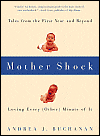 Mother Shock: Loving Every (Other) Minute of It by Andrea J. Buchanan (2003) — This is a series of essays, divided into four segments: Mother Love (the bliss of new motherhood); Mother Shock (when bliss turns into exhaustion and feeling completely overwhelmed); Mother Tongue (finally starting to acclimate to motherhood); and Mother Land (total adjustment). Buchanan writes in a crisp, tight manner and engages the reader with great compassion and candor about this boot camp and roller coaster ride of early motherhood. And, like Maushart, Buchanan laments the fact that we do not encourage mothers to discuss the isolating and darker side of mothering — the insecurities and confusion and fear and ambivalence we sometimes feel along with the elation. In my favorite essay, “Loving Every (Other) Minute of It,” she opens by saying that it’s unfortunate that, when mothers attempt to discuss these things, they are seen as ungrateful, unhappy, or even unhinged. Believe me, I have had to convince myself repeatedly that it’s even okay to post this motherhood entry to the blog, reminding myself that I may look like an ingrate and reminding myself that I have several friends who have had multiple, devastating, soul-shaking miscarriages — one right after another. But we can talk about marriages and our jobs in such a manner without being labelled as miserable or self-centered or thankless, so why can’t we discuss motherhood that way? So, Buchanan goes on to list what she does not love every minute of when it comes to mothering, having clearly established that, indeed, she is very grateful for her happy, healthy, beautiful child — watching “The Teletubbies,” having her sleep interrupted, the seemingly never-ending laundry, cleaning up toys, and, may I add, not being able to use the bathroom by yourself most days. It’s liberating to read, and Buchanan writes with a bit more hope than Maushart.
Mother Shock: Loving Every (Other) Minute of It by Andrea J. Buchanan (2003) — This is a series of essays, divided into four segments: Mother Love (the bliss of new motherhood); Mother Shock (when bliss turns into exhaustion and feeling completely overwhelmed); Mother Tongue (finally starting to acclimate to motherhood); and Mother Land (total adjustment). Buchanan writes in a crisp, tight manner and engages the reader with great compassion and candor about this boot camp and roller coaster ride of early motherhood. And, like Maushart, Buchanan laments the fact that we do not encourage mothers to discuss the isolating and darker side of mothering — the insecurities and confusion and fear and ambivalence we sometimes feel along with the elation. In my favorite essay, “Loving Every (Other) Minute of It,” she opens by saying that it’s unfortunate that, when mothers attempt to discuss these things, they are seen as ungrateful, unhappy, or even unhinged. Believe me, I have had to convince myself repeatedly that it’s even okay to post this motherhood entry to the blog, reminding myself that I may look like an ingrate and reminding myself that I have several friends who have had multiple, devastating, soul-shaking miscarriages — one right after another. But we can talk about marriages and our jobs in such a manner without being labelled as miserable or self-centered or thankless, so why can’t we discuss motherhood that way? So, Buchanan goes on to list what she does not love every minute of when it comes to mothering, having clearly established that, indeed, she is very grateful for her happy, healthy, beautiful child — watching “The Teletubbies,” having her sleep interrupted, the seemingly never-ending laundry, cleaning up toys, and, may I add, not being able to use the bathroom by yourself most days. It’s liberating to read, and Buchanan writes with a bit more hope than Maushart.
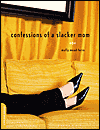 Too much for you? Let’s switch gears to Muffy Mead-Ferro’s Confessions of a Slacker Mom (2004). Don’t let the humorous, self-deprecating title of this one fool you. Yes, it’s a quick, amusing read, but Mead-Ferro — in all her joking around — has a slew of wise and refreshing comments on motherhood and competitive parenting to make. She does a fine job of bringing some common sense back to motherhood in an era when mothers strive for utter perfection. This book is a huge relief in a day and age when we mamas are flooded with titles (and magazine articles — oh, the magazine articles! Make them go away!) about how to be a better mother (“10 Ways to Lose That Baby Weight,” “15 Ways to Make Your Child Smarter,” “Is Your Child Eating Enough?” “Help Your Child Get the Most Out of Play,” you get the picture) — with the implication here, of course, being that we’re just not good enough and also trivializing the intensity and complexity of mothering. Mead-Ferro tackles the perfectionist urges to turn your child into a genius; nursery-accessorizing; educational toys; insane pre-school admission standards; the over-scheduled child; obsessive scrapbooking (her description of her mother’s version of memento-keeping brought tears to my eyes); and much more. And, she writes, a working mother is not going to damage her child. Unfortunately, lots of mamas today in the era of the inane “Mommy Wars” — a creation of the media that just manages to divide women — really need to hear that. If you’re looking for another parenting manual (sigh), this book is not for you. Not, I repeat. In fact, it would just outright piss you off. Trust your instincts, Mead-Ferro says. How refreshing to read.
Too much for you? Let’s switch gears to Muffy Mead-Ferro’s Confessions of a Slacker Mom (2004). Don’t let the humorous, self-deprecating title of this one fool you. Yes, it’s a quick, amusing read, but Mead-Ferro — in all her joking around — has a slew of wise and refreshing comments on motherhood and competitive parenting to make. She does a fine job of bringing some common sense back to motherhood in an era when mothers strive for utter perfection. This book is a huge relief in a day and age when we mamas are flooded with titles (and magazine articles — oh, the magazine articles! Make them go away!) about how to be a better mother (“10 Ways to Lose That Baby Weight,” “15 Ways to Make Your Child Smarter,” “Is Your Child Eating Enough?” “Help Your Child Get the Most Out of Play,” you get the picture) — with the implication here, of course, being that we’re just not good enough and also trivializing the intensity and complexity of mothering. Mead-Ferro tackles the perfectionist urges to turn your child into a genius; nursery-accessorizing; educational toys; insane pre-school admission standards; the over-scheduled child; obsessive scrapbooking (her description of her mother’s version of memento-keeping brought tears to my eyes); and much more. And, she writes, a working mother is not going to damage her child. Unfortunately, lots of mamas today in the era of the inane “Mommy Wars” — a creation of the media that just manages to divide women — really need to hear that. If you’re looking for another parenting manual (sigh), this book is not for you. Not, I repeat. In fact, it would just outright piss you off. Trust your instincts, Mead-Ferro says. How refreshing to read.
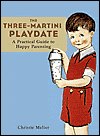 The Three-Martini Playdate: A Practical Guide to Happy Parenting (2004) by Christie Mellor — I want to give this book to every pregnant woman I know or will meet for the rest of my life. Oh, and even to women I know who are not pregnant and my friends who do not want to have kids. It’s that funny and that good. With its cheeky, retro-design and its wry, tongue-in-cheek tone, Mellor has a lot to say to those parents whose children pretty much rule the roost and who need to stand up and take back their lives with some quality, grown-up time (“Let us be perfectly frank,” she writes. “You were here first”). Mellor riffs on excessive childproofing in our homes; the fear some have of saying “no” to their child (with the chapter title, “Screaming: Is It Necessary?”); the harried, over-scheduled child not left to learn to play on her own. And she has a chapter on why we should just avoid children’s music altogether (“Children’s Music: Why?”) that made me laugh very hard as well as impressed me with its wisdom (though, I must say, I created one kickin’ children’s music mix that, I promise, will not make the adults gag and that is, apparently, making its way across the country in bootleg form, since my mama friends — and their children — are all quite fond of it); Mellor speaks of the nauseating “Barney”-type songs. And her chapter on what she sees as a pathological dependence on Camcorders (“Your Child’s Life: Now Available on DVD!”) made me squeal in happiness and glowing, heartfelt agreement. This fabulous, little quick-read of a book is both a clever mockery of the didactic parenting manuals that glut the bookstore shelves and, at the same time, a snappy, intelligent, practical self-help guide in its own right that could be sub-titled, How to Avoid Raising a Brat. And it’s one that, with interludes in the form of cocktail recipes, will keep you laughing.
The Three-Martini Playdate: A Practical Guide to Happy Parenting (2004) by Christie Mellor — I want to give this book to every pregnant woman I know or will meet for the rest of my life. Oh, and even to women I know who are not pregnant and my friends who do not want to have kids. It’s that funny and that good. With its cheeky, retro-design and its wry, tongue-in-cheek tone, Mellor has a lot to say to those parents whose children pretty much rule the roost and who need to stand up and take back their lives with some quality, grown-up time (“Let us be perfectly frank,” she writes. “You were here first”). Mellor riffs on excessive childproofing in our homes; the fear some have of saying “no” to their child (with the chapter title, “Screaming: Is It Necessary?”); the harried, over-scheduled child not left to learn to play on her own. And she has a chapter on why we should just avoid children’s music altogether (“Children’s Music: Why?”) that made me laugh very hard as well as impressed me with its wisdom (though, I must say, I created one kickin’ children’s music mix that, I promise, will not make the adults gag and that is, apparently, making its way across the country in bootleg form, since my mama friends — and their children — are all quite fond of it); Mellor speaks of the nauseating “Barney”-type songs. And her chapter on what she sees as a pathological dependence on Camcorders (“Your Child’s Life: Now Available on DVD!”) made me squeal in happiness and glowing, heartfelt agreement. This fabulous, little quick-read of a book is both a clever mockery of the didactic parenting manuals that glut the bookstore shelves and, at the same time, a snappy, intelligent, practical self-help guide in its own right that could be sub-titled, How to Avoid Raising a Brat. And it’s one that, with interludes in the form of cocktail recipes, will keep you laughing.
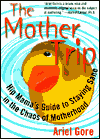 Mother Trip: Hip Mama’s Guide to Staying Sane in the Chaos of Motherhood (2000) by Ariel Gore — Gore is the founder of Hip Mama and also the author of The Hip Mama Survival Guide: Advice from the Trenches on Pregnancy, Childbirth, Cool Names, Clueless Doctors, Potty Training and Toddler Avengers (1998). Gore is a bleeding heart liberal, God love ‘er, had her daughter at age 19, and raised her alone while getting a college degree – often while on welfare to get by. Needless to say, she’s your source for left-of-center parenting, the antithesis of the Soccer Mom. The Survival Guide includes chapters such as “Guerrilla Mothering” and “Childbirth Sucks”; I think that’s enough to give you a sense of the tone of this self-help guide.
Mother Trip: Hip Mama’s Guide to Staying Sane in the Chaos of Motherhood (2000) by Ariel Gore — Gore is the founder of Hip Mama and also the author of The Hip Mama Survival Guide: Advice from the Trenches on Pregnancy, Childbirth, Cool Names, Clueless Doctors, Potty Training and Toddler Avengers (1998). Gore is a bleeding heart liberal, God love ‘er, had her daughter at age 19, and raised her alone while getting a college degree – often while on welfare to get by. Needless to say, she’s your source for left-of-center parenting, the antithesis of the Soccer Mom. The Survival Guide includes chapters such as “Guerrilla Mothering” and “Childbirth Sucks”; I think that’s enough to give you a sense of the tone of this self-help guide.
But it’s her Mother Trip title that I enjoyed more. This book is really a series of Gore’s essays in which she reminds us repeatedly that doing our best — not being the perfect mother — is all we have to do. One essay/chapter, “The Marathon Monks,” should be required reading for any mother (and takes about two minutes to read). And then there’s “Out of the Woods,” which had me in tears. She writes of how, when her daughter was younger, she’d tolerate with quiet annoyance those other mamas who stopped her to say that she needed to “enjoy it now,” that time flies and before you know it, your wee one would be grown. And she found herself wishing her daughter’s life away at times (it just has to get easier, she’d think, waiting for the next stage of her child’s development). She felt identity-less, fading into the background, being called upon only to provide the details of her daughter’s development — how long she’d been teething, how many months old she was — and even started to enjoy being removed from others, all asunder in the background. But then, she writes, “{n}ow if I told you how much I miss being joined at the hip with my daughter, you might roll your eyes. If I admitted that I still calculate, periodically, Maia’s precise age, you might let out a little sigh at my sentimentalism.” She writes further:
“{T}his is my new identity crisis:
It is a free-floating anxiety that attaches itself to telephones that ring too late at night.
It is meeting a woman at a party who asks me how old Maia is. I say, ‘seven,’ and the woman says ‘so you’re out of the woods,’ and suddenly I have the urge to correct myself: ‘seven-and-a-half-and-a-week-and-two-days, actually.’ Out of the woods.
It is a bath I can steep in, uninterrupted, until the water gets cold . . .
It is listening to friends without kids complain about how weird their moms are and offering, ‘I can tell you how she got that way.’
It is leaning over instinctively to let Maia climb up onto my hip when she is tired and falling over as she lifts her full weight onto my side.
It is no one ever saying ‘you look too young to be a mother’ anymore.
It is an impossibly hot August day on a New York subway, and I miss those crazy woods so much my jaw hurts.
Aw, man. That piece of writing makes my heart do a little flip or two.
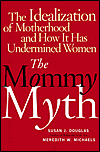 The Mommy Myth: The Idealization of Motherhood and How It Has Undermined All Women (2004) by Susan Douglas and Meredith Michaels —
The Mommy Myth: The Idealization of Motherhood and How It Has Undermined All Women (2004) by Susan Douglas and Meredith Michaels —
Okay, I probably have the most to say about this one, so bear with me. And I’ll, ahem, try not to ramble, something at which I am — unfortunately — very talented. This is a book that most people will either love or hate with a fervent passion, but — par for the course for me — I can see both sides of the argument here.
The titular myth here is one of the mother who wears her baby in a sling all day; lines up the wee one’s day with activity after activity that involves lots of Play-Doh, macrame, and pipe cleaners; is always smiling; and has the patience of Job — in short, operating with such all-encompassing self-sacrifice that she has nothing of herself left. (And if you think that’s a mama stereotype from long ago, look around again, particularly on t.v. and in parenting magazines).
Douglas and Michaels call these idealized standards — ones they believe to be overly perfectionist and crippling for women today — the “new Momism” and assert that they pervade motherhood today as well as undermine feminism. They take on the media and how it has changed over the years — 1970 to the present — to give us what is considered the ideal mom, even taking on the fear tactics used by the mainstream media when it comes to such things as child abduction and daycare scares; they take on celebrity mothers, pitted against the welfare mother (a most enlightening chapter), whose sole purpose, they posit, is to make us feel inadequate (I have to add that, while I think Gwyneth Paltrow has some talent, she really needs to stop saying in interviews that all other Hollywood actresses just need to take a break from their film-making and have babies — Gwynnie, it’s just not for everyone, okay?); they take on the government for its lip service about family values but non-existent mother- and family-friendly policies (scant and unpaid maternity leave options, no paternity leave, very few jobs that offer flex-time positions, no federally-subsidized and standardized daycare, etc.); and much, much more. They even take on the beloved Dr. William Sears and his advice-giving empire (and no matter what you think of attachment parenting, their assessment of it is rather incorrect and unfair) and the modern mother’s anxiety over raising the next (Baby) Einstein by ensuring she buys every perfect educational toy and DVD.
This book is eye-opening, and I always enjoy a nudge when it comes to looking at our culture with a more critical eye, especially now that I’m a mother. Having said that, though, the authors’ tone in this book is one of sheer snarkiness. This was funny for about the length of the introduction, but then it started to wear on me. I also felt Douglas and Michaels were condascending to so called stay-at-home moms. They see the issue of motherhood in an all-too-polarized fashion; heaven forfend if any woman were to see motherhood and feminism in a light different from them — and operate on those beliefs. And please find me one mother who hasn’t felt and/or doesn’t currently feel ambivalence — and ongoing ambivalence, at that –about whether to return to work or stay home with her child(ren) and for many reasons; it’s not a black and white issue (unfortunately, thanks to our non-existent family-friendly governmental policies). What a shame that the authors see it only one way, since the feminism movement was originally all about women making choices that were best for them, including mama issues — whether to return to the work force after giving birth or stay home to raise their child. We have enough of the asinine and unnecessary “Mommy Wars” to hear about when, really, we all want the same thing (such as, the aforementioned flex-time jobs, for instance), and here are Douglas and Michaels making it worse instead of reminding us mamas that we need to join together to fight for change for all mothers. Bottom line: The sad irony here is that the authors seem to be implying that there is only one correct way to mother, while at the same time warning us to stand firm against the media’s images of the perfect mother in the mothering magazine who is telling you the correct way to mother. Hmmm . . .
On this note, as they continually mock this image of the baby-wearing, co-sleeping, never-raising-her-voice mama, they take an episode of the old prime-time drama “Thirtysomething” and analyze a transcript of it. It’s an episode in which one of the main characters, Hope, is extremely distraught over the fact that her baby has weaned herself from breastfeeding. Now, not only do I not have time to read such trivial analyses (I have many more books to read, thank you very much), I also can actually understand why that would make a mother feel a little bittersweet. I know mothers who mourn the fact that their child will no longer be nursing, and when my oldest daughter was weaned, I felt a short but sharp pang of sadness myself, simply because she was all growin’ up on me. Sure, there are days when breastfeeding was the last thing I wanted to do — especially in those beginning days when “it hurts like a rhesus monkey biting your nipples” (see review of Stefanie Wilder-Taylor’s book below) — but, again, let’s not ever simplify the issue in such a binary fashion. Just because a mama might feel saddened to see nursing slip away doesn’t mean she can be lumped into a category like Douglas and Michaels seem to do — and then mocked for it. I sometimes found myself wanting to find them and, as Haven Kimmel/Zippy would say, go on a wild slapping spree.
All in all and believe it or not, I recommend this book for the thought-provoking critiques of our modern governmental policies and social systems in regards to motherhood, but be prepared for the authors’ mocking tone. Oh, and may I add parenthetically here that, though I admit to chuckling over their critique of Sears and his baby-wearing urges (I’m all for slings, but I doubt that man has ever tried to unload a dishwasher while his baby hangs out of a sling off his chest), I’d still give the man a big ‘ol kiss if I ever saw him, since his advice on what he calls high-need babies saved my sanity with my first daughter. Again, there is rarely — if ever — merely black and white when it comes to complex mothering issues, except when it comes to the fierce, protective love we feel for our children; the book would have been loads more tolerable if the authors had remembered that.
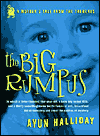 The Big Rumpus: A Mother’s Tale from the Trenches (2002) by Ayun Halliday — Halliday, founder of the quarterly zine, The East Village Inky, named after her daughter India (Inky), is a talented writer — she’s good-humored, sharp-witted, confessional. And in this title she gives us a series of essays on life in the trenches as an urban stay-at-home mom in the East Village of New York City. My only gripe is that she can be pretty long-winded and off-the-point, though she generally tells a good tale; she even spends a good deal of time reflecting upon her youth (those unsettled by cursing need not read this one). One of my favorite essays is, essentially, a love letter to her young babe of a son. This is another keeper if you’re looking for an author who will honestly discuss both the ups and downs of motherhood. Halliday has no qualms with sharing her more blundering, graceless moments as a mother — very cathartic, indeed, to read.
The Big Rumpus: A Mother’s Tale from the Trenches (2002) by Ayun Halliday — Halliday, founder of the quarterly zine, The East Village Inky, named after her daughter India (Inky), is a talented writer — she’s good-humored, sharp-witted, confessional. And in this title she gives us a series of essays on life in the trenches as an urban stay-at-home mom in the East Village of New York City. My only gripe is that she can be pretty long-winded and off-the-point, though she generally tells a good tale; she even spends a good deal of time reflecting upon her youth (those unsettled by cursing need not read this one). One of my favorite essays is, essentially, a love letter to her young babe of a son. This is another keeper if you’re looking for an author who will honestly discuss both the ups and downs of motherhood. Halliday has no qualms with sharing her more blundering, graceless moments as a mother — very cathartic, indeed, to read.
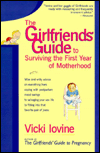 Vicki Iovine’s Girlfriends’ Guides — Iovine’s Girlfriends’ Guide to Surviving the First Year of Motherhood (1997) and Girlfriends’ Guide to Toddlers (1999) are fun, informative reads. Honestly, I thought they might be overly schmaltzy-sweet and/or too aw-snap-snap-come-on-girlfriend-talk-to-the-hand, but that shows you what I know. Iovine is one hot, hip mama, and she remembers all the sleepless nights, engorged and leaky breasts, breast pumping, and downright diabolical toddler tantrums. She speaks to us tired and sometimes confused mamas in a chummy, chatty, sisterly, devoted tone. She’s been there, and she’s got her hand on our shoulder — with her posse of Girlfriends backing her up — to give us a guiding hand (the number one rule of the Girlfriend Code is that the condascending, preachy, know-it-all, perfectionist mamas are not to be tolerated — how can we not wanna join Iovine’s gang of friends?). Any mama not immediately surrounded by a loving circle of mama friends, thus perhaps feeling isolated, will get much from these books. You will quickly see that these are not how-to-care-for-the-wee-one manuals; they are how-to-care-for-mama guides with practical, hysterical, and sane advice (labor, nursing, postpartum depression, post-baby relations with your significant other, whether or not you’ll ever see your belly button again, etc.) on keeping you and your family sane during the tough beginning years of motherhood.
Vicki Iovine’s Girlfriends’ Guides — Iovine’s Girlfriends’ Guide to Surviving the First Year of Motherhood (1997) and Girlfriends’ Guide to Toddlers (1999) are fun, informative reads. Honestly, I thought they might be overly schmaltzy-sweet and/or too aw-snap-snap-come-on-girlfriend-talk-to-the-hand, but that shows you what I know. Iovine is one hot, hip mama, and she remembers all the sleepless nights, engorged and leaky breasts, breast pumping, and downright diabolical toddler tantrums. She speaks to us tired and sometimes confused mamas in a chummy, chatty, sisterly, devoted tone. She’s been there, and she’s got her hand on our shoulder — with her posse of Girlfriends backing her up — to give us a guiding hand (the number one rule of the Girlfriend Code is that the condascending, preachy, know-it-all, perfectionist mamas are not to be tolerated — how can we not wanna join Iovine’s gang of friends?). Any mama not immediately surrounded by a loving circle of mama friends, thus perhaps feeling isolated, will get much from these books. You will quickly see that these are not how-to-care-for-the-wee-one manuals; they are how-to-care-for-mama guides with practical, hysterical, and sane advice (labor, nursing, postpartum depression, post-baby relations with your significant other, whether or not you’ll ever see your belly button again, etc.) on keeping you and your family sane during the tough beginning years of motherhood.
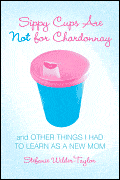 Sippy Cups Are Not for Chardonnay: And Other Things I Had to Learn as a New Mom by Stefanie Wilder-Taylor (2006) — Wilder-Taylor is a comedian, and she, like Mead-Ferro and Mellor, is trying to bring some much-needed common sense back into modern parenting. When I read the blurb about this book and saw this short excerpt from it — “Your baby doesn’t need to be making friends at three months old — you do! But not with people you’ll meet at Mommy & Me” — I knew it was for me. Attachment parent advocates will take offense when she writes, “If you’re holding your baby 24/7, that’s not a baby, that’s a tumor.” But oh this book is hysterical. Her chapter on mothers who obsess over the baby’s pediatrician — before the baby is even born — and make endless lists of questions for the hapless candidates is terrifically funny (again, if you’re squeamish about $^*!#$%! cursing, then stay away from this title). Yes, yes, I know the baby’s pediatrician is important; please don’t send me hate mail, but, well, some folks really do go overboard. And she likens the anxieties of meeting other new mamas to dating for the first time, which I found amusing and resonating. Wilder-Taylor’s primary gripe is about how the modern mother is an unfortunate target for unsolicited advice and the fear tactics therein — the frightful warnings of all manner of grim and distressing things that will happen if that advice from complete strangers (and parenting manuals and magazines and sleep training books) is not followed. She’s rallying a call to arms for all mothers who need to wrest a little bit of their lives back with some valuable and replenishing me-time. This book is great fun — and very wise in spots. Read it if you’ve ever — for even one day — doubted yourself as a mother. You need this laugh.
Sippy Cups Are Not for Chardonnay: And Other Things I Had to Learn as a New Mom by Stefanie Wilder-Taylor (2006) — Wilder-Taylor is a comedian, and she, like Mead-Ferro and Mellor, is trying to bring some much-needed common sense back into modern parenting. When I read the blurb about this book and saw this short excerpt from it — “Your baby doesn’t need to be making friends at three months old — you do! But not with people you’ll meet at Mommy & Me” — I knew it was for me. Attachment parent advocates will take offense when she writes, “If you’re holding your baby 24/7, that’s not a baby, that’s a tumor.” But oh this book is hysterical. Her chapter on mothers who obsess over the baby’s pediatrician — before the baby is even born — and make endless lists of questions for the hapless candidates is terrifically funny (again, if you’re squeamish about $^*!#$%! cursing, then stay away from this title). Yes, yes, I know the baby’s pediatrician is important; please don’t send me hate mail, but, well, some folks really do go overboard. And she likens the anxieties of meeting other new mamas to dating for the first time, which I found amusing and resonating. Wilder-Taylor’s primary gripe is about how the modern mother is an unfortunate target for unsolicited advice and the fear tactics therein — the frightful warnings of all manner of grim and distressing things that will happen if that advice from complete strangers (and parenting manuals and magazines and sleep training books) is not followed. She’s rallying a call to arms for all mothers who need to wrest a little bit of their lives back with some valuable and replenishing me-time. This book is great fun — and very wise in spots. Read it if you’ve ever — for even one day — doubted yourself as a mother. You need this laugh.
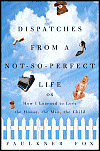 Dispatches from a Not-So-Perfect Life: Or How I Learned to Love the House, the Man, the Child by Faulkner Fox (2003) — This book was recommended by a good friend who, thankfully, warned me that Fox can be a bit angsty in this one. But it’s worth the read. Fox is passionate about where motherhood and feminism meet and writes with honesty and vision — and a healthy dose of irreverence. She writes of her “by-the-sea fantasy life” she had imagined as a teen that she would live in as an adult:
Dispatches from a Not-So-Perfect Life: Or How I Learned to Love the House, the Man, the Child by Faulkner Fox (2003) — This book was recommended by a good friend who, thankfully, warned me that Fox can be a bit angsty in this one. But it’s worth the read. Fox is passionate about where motherhood and feminism meet and writes with honesty and vision — and a healthy dose of irreverence. She writes of her “by-the-sea fantasy life” she had imagined as a teen that she would live in as an adult:
“I’m still quite fond of my . . . fantasy of life with a preternaturally quiet child and gourmet man, yet I also see it as a chilly, controlled vision. In real life, where nothing is guaranteed or predicatable, moments of transcendence happen even as some shout . . . If this is life with others, I choose it over the dream. In terms of motherhood, I choose and continue to choose it with joy. At the same time, I feel compelled to speak up when I see something damaging to mothers, particularly if it seems insisted on by our culture.”
Her “Frequenting Parenting Miles” became a bit grating (literally counting and charting the hours she spent caring for her two children compared to how many hours her husband put in), but her larger point is whether it’s truly even possible for her enlightened, feminist husband and her enlightened, feminist self to equally share the house work and child care. Her chapter on the compelling need to meet other mothers and her frank discussions of her general quest to maintain her sense of individuality after having borne children made this one a title I’d recommend as well.
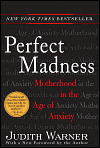 Perfect Madness: Motherhood in the Age of Anxiety (2005) by Judith Warner — Warner experienced some relaxed mothering in France when her daughter was a wee babe, only to return to the States and wonder why motherhood suddenly became so stressful and was so for those around her. She interviews a group of mothers who are pretty much just like her — aged 20 to 40, middle- to upper-class, college-educated, and mostly white. Though this is clearly not a broad, all-encompassing study, she discusses some important, complex topics when it comes to motherhood and the anxiety it is rife with for many mothers today. She takes on the dearth of mother-friendly public policies; what she calls “hyper-parenting” (the pre-school-aged child who has entirely too many extracurricular activities); how traditional gender roles can rear its head in a post-baby marriage and how this can be a shock for most women who grew up in the ’70s, a time in which feminism seemed to be at its peak; and the ridiculous “Mommy Wars.” Unfortunately, Warner doesn’t propose many solutions. I also felt, quite frankly, embarrassed reading about middle- and upper-middle class mothers freaking out over throwing the perfect birthday party and buying the perfect educational toys when there are single mothers out there working three jobs to keep their kids fed. Yes, contemporary American mothers can be anxiety-filled, but not all of them are. And, sadly, she fails to include the joys and beauties and remarkable epiphanies of motherhood.
Perfect Madness: Motherhood in the Age of Anxiety (2005) by Judith Warner — Warner experienced some relaxed mothering in France when her daughter was a wee babe, only to return to the States and wonder why motherhood suddenly became so stressful and was so for those around her. She interviews a group of mothers who are pretty much just like her — aged 20 to 40, middle- to upper-class, college-educated, and mostly white. Though this is clearly not a broad, all-encompassing study, she discusses some important, complex topics when it comes to motherhood and the anxiety it is rife with for many mothers today. She takes on the dearth of mother-friendly public policies; what she calls “hyper-parenting” (the pre-school-aged child who has entirely too many extracurricular activities); how traditional gender roles can rear its head in a post-baby marriage and how this can be a shock for most women who grew up in the ’70s, a time in which feminism seemed to be at its peak; and the ridiculous “Mommy Wars.” Unfortunately, Warner doesn’t propose many solutions. I also felt, quite frankly, embarrassed reading about middle- and upper-middle class mothers freaking out over throwing the perfect birthday party and buying the perfect educational toys when there are single mothers out there working three jobs to keep their kids fed. Yes, contemporary American mothers can be anxiety-filled, but not all of them are. And, sadly, she fails to include the joys and beauties and remarkable epiphanies of motherhood.
Thanks for reading my long post. I promise they won’t all be this long. As you can see, I was positively wrapped up in this topic for quite a while. I figure, if you’ve made it to this point in the post, you’re one spirited literary mama, so may I give you two more Web site tips? See our “Seven Impossible Book Sites” category to the right, and click on Literary Mama and Mother Talk. Ciao.

Julie- you write so well. This blog is excellent!! I’m so impressed and so excited about it – go mama – you rock! 🙂
thanks for the compliment, pamela! you are the one i have to thank for turning me on to these books to begin with. i wanna hear more about ‘mommy brain,’ your current read, when you get a chance!
Jules,
Wonderful to read! I kept nodding “right, R-I-G-H-T!” at several of the comments.
Guilty of saying “Enjoy it now. Time passes fast” Mea culpa.
Thanks for starting this blog!
Betty, if you’re talking about Ariel Gore, I think her point was that she was annoyed at first with hearing the “enjoy-it-nows” but then that she turned around and her daughter was SEVEN and she finally understood. Anyway I, for one, always need the reminder. I’m bad about thinking, ‘it’ll get easier when they’re older,’ and then I have to remind myself to take a breath and enjoy it NOW. Betty, I always think of you when I kiss Ada’s neck. I remember you saying you enjoyed that baby smell at the back of their heads. It’s true — I always think of you telling me that when I smell that wonderful baby smell. But now I have to go, ’cause Miriam just said she has something for me — a ball and a pinwheel. How can I pass that up? — j.
[…] much propping-up of kids. There’s a great book called Confessions of a Slacker Mom (included in the first 7-Imp post I ever did, I think) in which she talks about a lot of things, but one of them is this notion that this […]